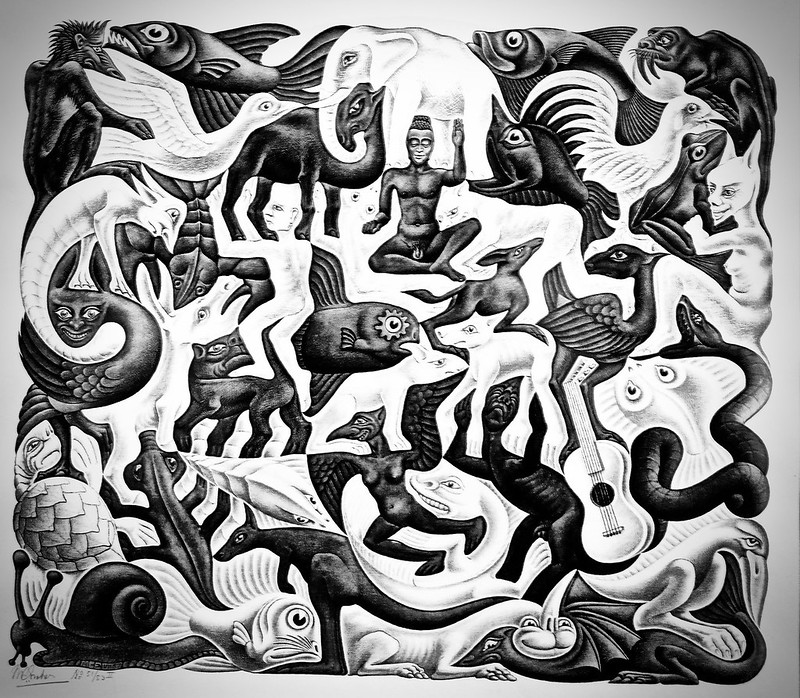Self-Knowledge • Behaviours
The Hidden Logic of Illogical Behaviour
The world is filled with people – they may be us at times – who appear to keep acting in ways that mysteriously run entirely contrary to their own interests.

Let’s consider a range of examples:
— Someone who keeps withdrawing from their romantic partners as soon as emotional intimacy and closeness are options – which ends up reliably destroying one relationship after another.
— Someone talented who nevertheless continuously messes up whenever they face an important challenge at work – and so wrecks any chance of professional advancement.
— Someone who keeps calling themselves a terrible person and suffers dramatically low levels of self-esteem, though they would have so much to feel proud of if only they assessed themselves more fairly.
— Someone who keeps falling prey to hypochondriacal illnesses that make a free and happy life impossible.
— Someone who throws themselves manically into work or household tasks and thereby removes any opportunity for acknowledging their feelings or developing their mind.
— Someone who keeps resorting to attention-seeking behaviour and so annoys people who would have been quite capable of giving them their time if only they had asked for it in sensible ways.
We may step back and wonder: why do these people act in such a contradictory and perverse manner? Why do their actions defy logic?
But this is to misunderstand the workings of our psyches. These so-called perverse actions are not at heart unreasonable at all. These violations of logic are not – considered properly – illogical in the least. It’s just that they are out of synch. They are happening at the wrong time, in the wrong place, with the wrong people. These are adaptive strategies that have grown maladaptive. They are, each one of them, manifestations of behaviours that once made profound sense – in a world of intensely challenging childhoods that no longer exists.
Let’s consider our examples one by one:
— If we happened to have a parent whose affection was unsteady, who drank a lot or who might have tried to commit suicide a number of times, how supremely sensible to develop a capacity to go intensely cold whenever an intimate relationship becomes a possibility. This isn’t a pathology, this isn’t stupidity. It’s a survival strategy – all the more impressive if it was devised when we were five years old.
— Or if we had a parent who was extremely vengeful and threatened by our success, what imagination to work out that – in order to make it – we needed to keep failing. What a triumph to deduce so early on the life-saving advantages of underperformance.
— Or if we had a parent who treated us badly, how inventive to choose to hate ourselves rather than rage at them, given that this allowed us to feel in control and maintain a highly necessary illusion that we had a fundamentally good parent; it was just that we needed to try harder.
— Or if we had a caregiver who only loved us when we were unwell, what brilliance to develop a string of somewhat made-up ailments that might have annoyed doctors, but offered us a steady route to tenderness.
— Or if our parents were divorcing and our pain from their split was unbearable, how brilliant to make sure we were so manically busy, we would never need to feel very much at all.
— And if our parents were distracted, how admirable to develop ways of guaranteeing that we could secure their attention by continually making a drama or getting into trouble.
The most fruitless and counter productive behaviours of adulthood all reveal a logic, once we cease to search for this logic in the present. Whenever we consider a so-called neurosis, we need to ask ourselves: was there ever a time when it might have made sense? Was there ever a situation when it belonged to survival, when it would have helped us to get to the next stage, when it provided a way for us to win the love and care we required?

We may then be able to direct considerable compassion – even admiration – at how creative we were in response to our difficulties. But we also have a chance to put in place new behaviours that better suit our present era and aspirations:
— Once upon a time, there was a logic to being walled in and distant: now it means we’ll die alone.
— Once it was logical to fail, now we’re sabotaging our way to penury.
— Once low self-esteem belonged to survival; now it violates the essence of who we are.
— Once being constantly ill brought love, now it stops us from existing
— Once escaping all self-exploration kept us safe, now it prevents us from knowing who we are.
— Once theatricality brought us attention, now it alienates those who already care for us.
We might think of ourselves as containing a number of younger children who keep acting according to previously-worthwhile scripts. We can be gentle with them. They are doing their best. What they propose isn’t ‘crazy’; it just inappropriately timed. We need to learn to see the survival strategy that our neuroses embody, accept how unnecessary they now are and recognise how much we can and should let go of them – with gratitude for the creativity they contain and for the safety they once offered. We should beware of ever dismissing our self-harming behaviours as meaningless. We should learn to search for their purpose, find it, and then be kind enough to ourselves to discard it in the name of protecting the person we now need to become.



























